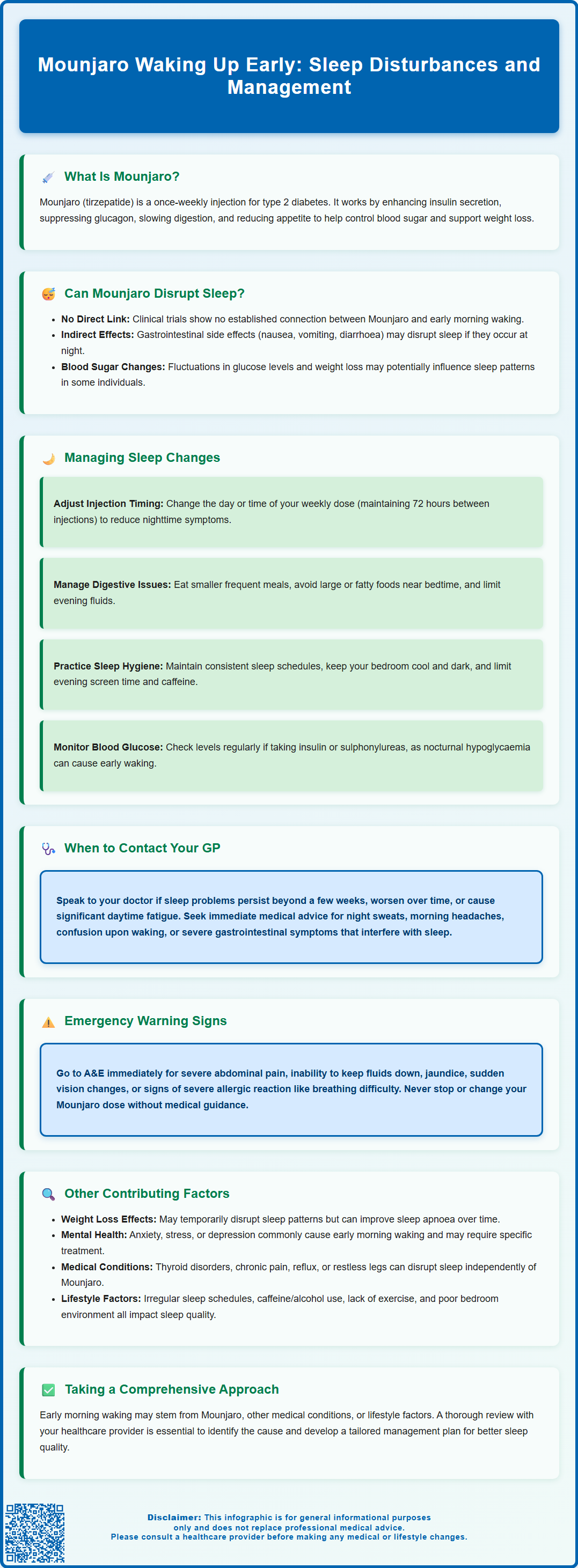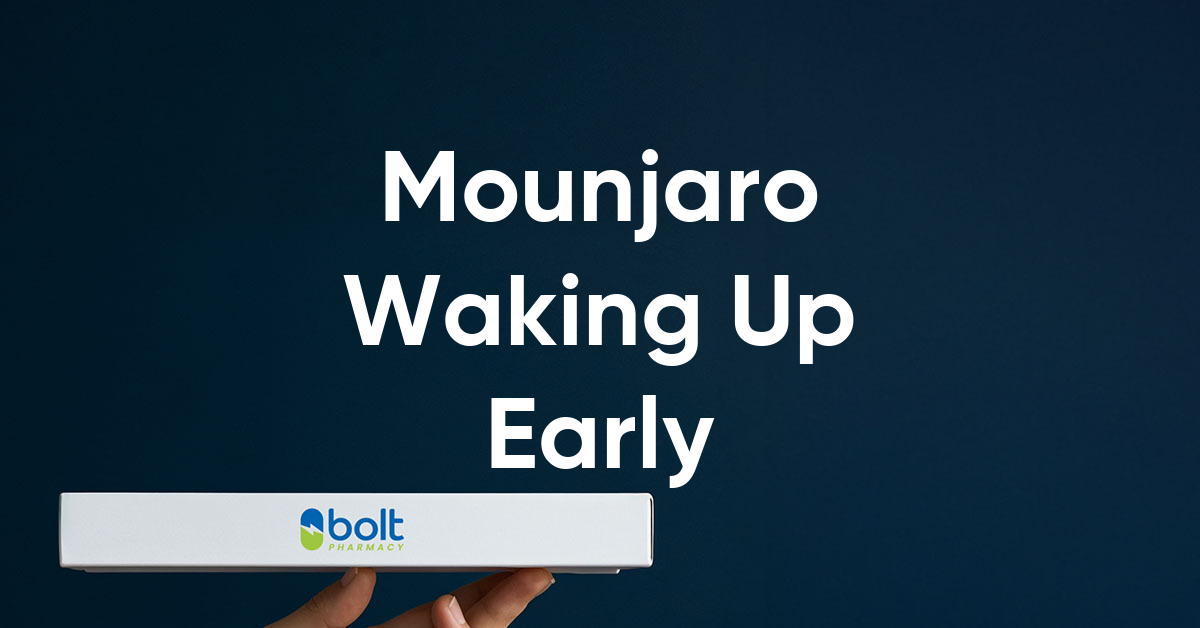Mounjaro (tirzepatide) is a once-weekly injectable medication licensed in the UK for type 2 diabetes and weight management in adults with obesity or overweight with weight-related comorbidities. Some patients have reported waking up early or experiencing sleep disturbances whilst taking Mounjaro, though sleep problems are not listed as adverse reactions in the UK Summary of Product Characteristics. This article examines the potential relationship between Mounjaro and early morning waking, explores possible contributing factors such as gastrointestinal side effects and blood glucose changes, and provides practical guidance on managing sleep disturbances and when to seek medical advice.
Summary: There is no established direct link between Mounjaro (tirzepatide) and early morning waking in clinical trial data, though some patients report sleep changes.
- Mounjaro is a dual GIP and GLP-1 receptor agonist licensed in the UK for type 2 diabetes and weight management.
- Sleep disturbances are not listed as adverse reactions in the UK Summary of Product Characteristics for Mounjaro.
- Gastrointestinal side effects such as nausea, vomiting, and abdominal discomfort may indirectly disrupt sleep continuity.
- Nocturnal hypoglycaemia risk increases when Mounjaro is combined with insulin or sulfonylureas, potentially causing early waking.
- Persistent sleep disturbances, severe gastrointestinal symptoms, or signs of hypoglycaemia warrant discussion with your GP or diabetes specialist nurse.
- Report suspected side effects through the MHRA Yellow Card scheme and never adjust your dose without medical guidance.
Table of Contents
Can Mounjaro Cause Early Morning Waking or Sleep Disturbances?
Mounjaro (tirzepatide) is a once-weekly injectable medication licensed in the UK for the treatment of type 2 diabetes mellitus. Tirzepatide is also licensed for weight management in adults with obesity or overweight with weight-related comorbidities, though this may be marketed under a different brand name. As a dual glucose-dependent insulinotropic polypeptide (GIP) and glucagon-like peptide-1 (GLP-1) receptor agonist, Mounjaro works by enhancing insulin secretion, suppressing glucagon release, slowing gastric emptying, and reducing appetite.
Sleep disturbances are not listed as adverse reactions in the UK Summary of Product Characteristics (SmPC) for Mounjaro. However, some patients have reported changes to their sleep patterns, including waking up earlier than usual. There is no established direct link between Mounjaro and early morning waking in clinical trial data. Individual experiences can vary, and several indirect factors may potentially contribute to altered sleep.
The most frequently reported side effects of Mounjaro include gastrointestinal symptoms such as nausea, vomiting, diarrhoea, constipation, and abdominal discomfort. These symptoms, particularly if they occur during the night or early morning, may disrupt sleep continuity and lead to earlier waking. Changes in blood glucose levels and weight loss may also influence sleep patterns in some individuals, though this relationship is not well established in clinical evidence.
It is important to note that sleep disturbances can arise from multiple factors, and attributing them solely to Mounjaro requires careful consideration of the broader clinical picture. If you are experiencing persistent early morning waking or other sleep problems since starting Mounjaro, it is advisable to discuss this with your GP or diabetes specialist nurse to explore potential contributing factors and appropriate management strategies.
Managing Sleep Changes While Taking Mounjaro
If you are experiencing early morning waking or other sleep disturbances whilst taking Mounjaro, there are several practical strategies that may help improve your sleep quality and overall wellbeing.
Optimising injection timing may be beneficial for some patients. Mounjaro is administered once weekly at any time of day, with or without meals. According to the SmPC, if necessary, the day of weekly administration can be changed as long as the time between two doses is at least 72 hours (3 days). If you miss a dose, administer it as soon as possible if there are at least 3 days (72 hours) until your next scheduled dose. If gastrointestinal side effects are disrupting your sleep, consider discussing with your healthcare provider whether adjusting the day or time of your injection might reduce nocturnal symptoms.
Managing gastrointestinal side effects is crucial, as nausea, bloating, or abdominal discomfort can significantly impact sleep. Eating smaller, more frequent meals throughout the day, avoiding large meals close to bedtime, and limiting fatty, spicy, or rich foods may help reduce nocturnal gastrointestinal symptoms. Staying well-hydrated during the day (but reducing fluid intake in the evening) can also support digestive comfort.
Maintaining good sleep hygiene is essential for anyone experiencing sleep disturbances. This includes:
-
Establishing a consistent sleep-wake schedule, even on weekends
-
Creating a comfortable, cool, dark, and quiet sleep environment
-
Limiting screen time and bright light exposure in the hour before bed
-
Avoiding caffeine and alcohol in the evening
-
Engaging in regular physical activity, but not too close to bedtime
-
Practising relaxation techniques such as deep breathing, progressive muscle relaxation, or mindfulness meditation
Monitoring blood glucose levels is particularly important for patients with type 2 diabetes. While Mounjaro has a low risk of hypoglycaemia when used alone, the risk increases significantly when used in combination with insulin or sulfonylureas. Nocturnal hypoglycaemia can cause early morning waking, sweating, and restlessness. If you are taking Mounjaro alongside these medications, discuss with your diabetes care team whether dose adjustments of these other medications might be needed to reduce hypoglycaemia risk.

When to Speak to Your GP About Sleep Problems on Mounjaro
Whilst mild, transient sleep changes may resolve as your body adjusts to Mounjaro, certain symptoms warrant prompt medical attention. You should contact your GP or diabetes specialist nurse if:
-
Sleep disturbances persist beyond the first few weeks of treatment or worsen over time
-
Early morning waking is accompanied by significant daytime fatigue, impaired concentration, or reduced quality of life
-
You experience symptoms suggestive of nocturnal hypoglycaemia, such as night sweats, vivid dreams, morning headaches, or waking with confusion
-
Gastrointestinal side effects (nausea, vomiting, diarrhoea, or abdominal pain) are severe, persistent, or interfering significantly with sleep and daily activities
-
You develop new or worsening symptoms of anxiety, low mood, or depression, which can both cause and result from chronic sleep disturbance
-
You notice signs of dehydration, such as dark urine, dizziness, or reduced urine output, particularly if experiencing vomiting or diarrhoea
Seek urgent medical advice via NHS 111 or attend A&E if you experience:
-
Severe, persistent abdominal pain (with or without vomiting) which could indicate pancreatitis
-
Inability to keep fluids down or signs of severe dehydration
-
Yellowing of the skin or eyes (jaundice), which may indicate gallbladder problems
-
Sudden visual changes
-
Signs of severe allergic reaction such as difficulty breathing, severe rash, or swelling
NICE guidance on the management of type 2 diabetes (NG28) emphasises the importance of individualised care and regular monitoring of treatment tolerability. Your healthcare provider can assess whether your sleep disturbances are related to Mounjaro, review your overall medication regimen, and consider dose adjustment or alternative treatment options if necessary.
If you believe you are experiencing side effects from Mounjaro, these can be reported through the MHRA Yellow Card scheme (yellowcard.mhra.gov.uk or the Yellow Card app).
Never stop or adjust your Mounjaro dose without medical guidance, as this may affect your diabetes control or weight management progress. Open communication with your healthcare team is essential to ensure safe, effective, and tolerable treatment.
Other Factors That May Contribute to Waking Up Early
When experiencing early morning waking whilst taking Mounjaro, it is important to consider other potential contributing factors beyond the medication itself. A comprehensive assessment can help identify the underlying cause and guide appropriate management.
Weight loss and metabolic changes associated with Mounjaro treatment may influence sleep patterns. Significant weight reduction can improve conditions such as obstructive sleep apnoea (OSA), but the process of losing weight may temporarily affect sleep patterns. If you experience symptoms of OSA such as loud snoring, witnessed breathing pauses during sleep, or excessive daytime sleepiness, discuss this with your GP as assessment and treatment may be needed in line with NICE guidance (NG202).
Psychological factors play a significant role in sleep quality. Anxiety, stress, and depression are common causes of early morning waking and sleep maintenance insomnia. Starting a new medication, concerns about health conditions, or lifestyle changes associated with weight management can all contribute to psychological stress that disrupts sleep. If you are experiencing low mood, persistent worry, or other mental health concerns, discuss these with your GP, as they may benefit from specific treatment.
Coexisting medical conditions should be considered. Type 2 diabetes itself can affect sleep through various mechanisms, including nocturia (frequent night-time urination), peripheral neuropathy causing discomfort, or poorly controlled blood glucose levels. Other conditions such as thyroid disorders, chronic pain, gastro-oesophageal reflux disease, or restless legs syndrome may also contribute to sleep disturbances.
Lifestyle and environmental factors are often overlooked but can significantly impact sleep. These include irregular sleep schedules, excessive daytime napping, consumption of caffeine or alcohol, lack of physical activity, bedroom environment (temperature, noise, light), and use of electronic devices before bed. Shift work, caring responsibilities, or other social factors may also disrupt normal sleep patterns.
A thorough review of all these factors with your healthcare provider can help determine whether your early morning waking is related to Mounjaro, another medical condition, or lifestyle factors, and guide appropriate management strategies tailored to your individual circumstances.
Frequently Asked Questions
Does Mounjaro cause early morning waking?
There is no established direct link between Mounjaro and early morning waking in clinical trial data. However, indirect factors such as gastrointestinal side effects, blood glucose changes, or weight loss may potentially influence sleep patterns in some individuals.
Can changing the time I inject Mounjaro help with sleep problems?
Mounjaro can be administered at any time of day, and the day of weekly administration can be changed as long as there are at least 72 hours between doses. Discuss with your healthcare provider whether adjusting injection timing might reduce nocturnal gastrointestinal symptoms affecting your sleep.
When should I contact my GP about sleep disturbances on Mounjaro?
Contact your GP if sleep disturbances persist beyond the first few weeks, cause significant daytime fatigue, or are accompanied by symptoms of nocturnal hypoglycaemia (night sweats, morning headaches), severe gastrointestinal side effects, or signs of anxiety or depression.
The health-related content published on this site is based on credible scientific sources and is periodically reviewed to ensure accuracy and relevance. Although we aim to reflect the most current medical knowledge, the material is meant for general education and awareness only.
The information on this site is not a substitute for professional medical advice. For any health concerns, please speak with a qualified medical professional. By using this information, you acknowledge responsibility for any decisions made and understand we are not liable for any consequences that may result.
Heading 1
Heading 2
Heading 3
Heading 4
Heading 5
Heading 6
Lorem ipsum dolor sit amet, consectetur adipiscing elit, sed do eiusmod tempor incididunt ut labore et dolore magna aliqua. Ut enim ad minim veniam, quis nostrud exercitation ullamco laboris nisi ut aliquip ex ea commodo consequat. Duis aute irure dolor in reprehenderit in voluptate velit esse cillum dolore eu fugiat nulla pariatur.
Block quote
Ordered list
- Item 1
- Item 2
- Item 3
Unordered list
- Item A
- Item B
- Item C
Bold text
Emphasis
Superscript
Subscript










